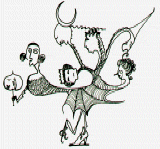
In 1833 John Joseph Mechi who lived at 4 Leadenhall St gave evidence
that helped to convict Henry Gordon at the Old Bailey of steeling
cloth and clothing from the Mechi dwelling.
Gordon, aged 25, was sentenced to transportation for life.
See: www.oldbaileyonline.org/
In Notes and Queries Number 65, January 25, 1851
read
the ebook Notes and Queries, Number 65, January 25, 1851:
"* * * * * WHERE TO BUY A DRESSING CASE.
In no article perhaps is caution more necessary than in the purchase of
a Dressing Case, for in none are the meretricious arts of the
unprincipled manufacturer more frequently displayed. MECHI, 4.
LEADENHALL STREET, near Gracechurch Street, has long enjoyed the
reputation of producing a Dressing Case in the most finished and
faultless manner. Those who purchase of him will be sure of having
thoroughly-seasoned and well-prepared wood or leather, with the fittings
of first-rate quality. The prices range from 1l. to 100l. Thus the man
of fortune and he of moderate means may alike be suited, while the
traveller will find the Mechian Dressing Case especially adapted to his
necessities.--4. LEADENHALL STREET. * * * * *
John Joseph Mechi's brief biography is given at:
www.london-city-history.org.uk/biography.htm
"Mechi,
John Joseph (1802-1880)
"businessman, agriculturist and City activist was
born in London on 22 May 1802. His father, Giacomo, was from Bologna and
held a position in the Court of George 111. Royal connections were
maintained as John claimed an early acquaintance with Queen Charlotte
and a fishing companion in the Duke of Sussex. As a youth of 16 he was
placed as a clerk in a mercantile house in Walbrook, concerned with
Newfoundland trade. He remained here for ten years until, having saved
enough money, he opened his own shop in Leadenhall Street. Here, he
designed the ‘Magic Razor Strop’, making enough money from the
business in the 1830s to move to larger premises but which thereafter
suffered when beards became fashionable. Despite this setback and not
for the first time, Mechi reinvented himself. This time, from 1859 to
1869, he went into partnership with Charles Bazan (Frederick Keats of
Fortnum & Mason’s was a colleague) marketing a patent in shop
window lamps at 112 Regent Street.
"By this time he had began to construct a model
farm at Tiptree Heath in Essex. This was the subject of extensive
publications, including the best seller How to Farm Profitably
(1857). The emphasis was on the use of deep drainage and steam power.
"Surprisingly, perhaps, Mechi found time to marry
twice: first in 1823 to Fanny Frost, and second to Charlotte Ward in
1846. The combined product of both unions was several daughters and one
son. He also gave his time to a number of other causes. He was member of
the Council of the Society of Arts, Juror in the Department of Arts and
Science at the 1851 General Exhibition and at the Industrial Exhibition
in Paris in 1855, as well as founder of the Royal Agricultural Benefit
Institution.
"Within the City of London he was appointed as a
Sheriff in 1856 and Alderman in the ward of Lime
Street in 1858. His luck run out in 1866, with the failure of the
Unity Joint Stock Bank, and a hapless connection with the General Life
Assurance Office eventually forced the liquidation of his assets. He
resigned his Aldermanic gown and after several bad seasons on the farm,
developed diabetes. He died at Tiptree Hall on 26 December 1880 and was
buried at the local church on the first day of the New Year."
